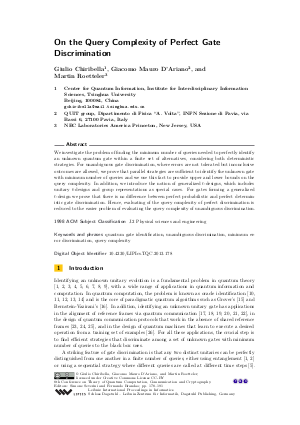On the Query Complexity of Perfect Gate Discrimination
Authors Giulio Chiribella, Giacomo Mauro D'Ariano, Martin Roetteler
-
Part of:
Volume:
8th Conference on the Theory of Quantum Computation, Communication and Cryptography (TQC 2013)
Part of: Series: Leibniz International Proceedings in Informatics (LIPIcs)
Part of: Conference: Conference on the Theory of Quantum Computation, Communication and Cryptography (TQC) - License:
 Creative Commons Attribution 3.0 Unported license
Creative Commons Attribution 3.0 Unported license
- Publication Date: 2013-11-13
File

PDF
LIPIcs.TQC.2013.178.pdf
- Filesize: 471 kB
- 14 pages
Document Identifiers
Subject Classification
Keywords
- quantum gate identification
- unambiguous discrimination
- minimum error discrimination
- query complexity
Metrics
- Access Statistics
-
Total Accesses (updated on a weekly basis)
0PDF Downloads0Metadata Views
Abstract
We investigate the problem of finding the minimum number of queries needed to perfectly identify an unknown quantum gate within a finite set of alternatives, considering both deterministic strategies. For unambiguous gate discrimination, where errors are not tolerated but inconclusive outcomes are allowed, we prove that parallel strategies are sufficient to identify the unknown gate with minimum number of queries and we use this fact to provide upper and lower bounds on the query complexity. In addition, we introduce the notion of generalized $t$-designs, which includes unitary t-designs and group representations as special cases. For gates forming a generalized $t$-design we prove that there is no difference between perfect probabilistic and perfect deterministic gate discrimination. Hence, evaluating of the query complexity of perfect discrimination is reduced to the easier problem of evaluating the query complexity of unambiguous discrimination.
Cite As Get BibTex
Giulio Chiribella, Giacomo Mauro D'Ariano, and Martin Roetteler. On the Query Complexity of Perfect Gate Discrimination. In 8th Conference on the Theory of Quantum Computation, Communication and Cryptography (TQC 2013). Leibniz International Proceedings in Informatics (LIPIcs), Volume 22, pp. 178-191, Schloss Dagstuhl – Leibniz-Zentrum für Informatik (2013)
https://doi.org/10.4230/LIPIcs.TQC.2013.178
BibTex
@InProceedings{chiribella_et_al:LIPIcs.TQC.2013.178,
author = {Chiribella, Giulio and D'Ariano, Giacomo Mauro and Roetteler, Martin},
title = {{On the Query Complexity of Perfect Gate Discrimination}},
booktitle = {8th Conference on the Theory of Quantum Computation, Communication and Cryptography (TQC 2013)},
pages = {178--191},
series = {Leibniz International Proceedings in Informatics (LIPIcs)},
ISBN = {978-3-939897-55-2},
ISSN = {1868-8969},
year = {2013},
volume = {22},
editor = {Severini, Simone and Brandao, Fernando},
publisher = {Schloss Dagstuhl -- Leibniz-Zentrum f{\"u}r Informatik},
address = {Dagstuhl, Germany},
URL = {https://drops.dagstuhl.de/entities/document/10.4230/LIPIcs.TQC.2013.178},
URN = {urn:nbn:de:0030-drops-43133},
doi = {10.4230/LIPIcs.TQC.2013.178},
annote = {Keywords: quantum gate identification, unambiguous discrimination, minimum error discrimination, query complexity}
}
